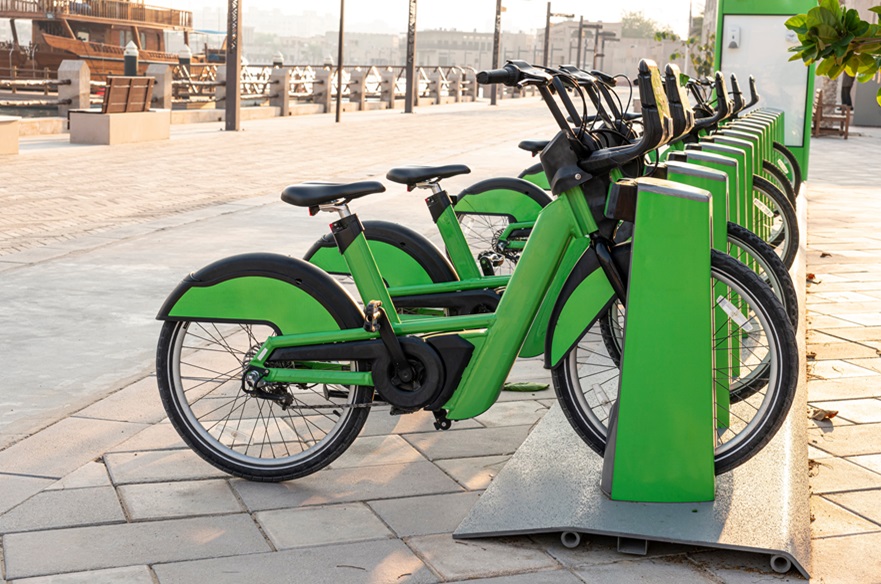Shoppers aren’t as motivated by sustainability as they claim, study shows
Consumers who consider themselves to be ‘sustainable practitioners’ may not be as well-intentioned towards the environment as they claim, new research by Nottingham Trent University shows.
By Chris Birkle | Published on 18 November 2024
Categories: Press office; Research; School of Architecture, Design and the Built Environment;

Consumers who consider themselves to be ‘sustainable practitioners’ may not be as well-intentioned towards the environment as they claim, new research shows.
A study found that around 70 per cent of people in the UK and China take part in ‘collaborative consumption’, which includes buying used items rather than new ones, and sharing goods and services such as bicycles through hire schemes.
But research by Nottingham Trent University (NTU) and Yonsei University, in South Korea, shows that people’s real motivations lie in saving money rather than being sustainable, despite their claims to the latter.
The research team call this a ‘value-action gap’ between what consumers say are their top motivations for buying goods collaboratively, in contrast to their real reasons.
The study – a survey of more than 600 people aged 18-to-74 in the UK and China - was undertaken to shed more light on the rationale of collaborative consumption.
Dr Jiaqi Bai, a researcher at NTU’s School of Architecture, Design and the Built Environment, who carried out the research as part of her recently completed PhD, said: “Our results are revealing as they show a high level of awareness of sustainability among consumers, and an inspiration for living a sustainable lifestyle amongst all the respondents, with 70.3% of them claiming to be an ‘active’ or ‘slightly active’ sustainable practitioner.
“But, interestingly, most of the respondents admitted that they didn’t approach collaborative consumption from the principle of sustainability, particularly those in China. Only 27.57% of British people ranked sustainability as their top choice for using collaborative consumption, while the percentage for Chinese respondents was even lower at 11.06%. The top choice for both was saving money.
“Our purchases can have a detrimental impact on the environment and understanding consumers’ real attitudes, and the context of their buying habits, is essential for us to promote the further adoption of collaborative consumption successfully. People just lowering their household energy use and recycling their waste is not enough to save the planet alone - we all need to shop smarter too.”
The most popular collaborative consumption activities in the UK are ride-sharing (42.5%) and buying second hand (39.7%). The UK has more than 3,800 shops that specialise in the sale of used goods and is considered a leading market for this in the world. Websites like eBay and Vinted, and car boot sales, are also examples of collaborative consumption in the UK.
In China, much of the country’s collaborative consumption takes place online on websites like Xianyu, which sells used items. Bike sharing has also experienced a rapid growth in China following the implementation of public bike sharing schemes such as Hellobike, which offers transportation services in the downtown areas of major Chinese cities.
Dr Daniel Shin, of the College of Human Ecology, Department of Human & Environment Design, Yonsei University, said: “This research shows that many consumers regard themselves as sustainable practitioners and claim to be confident about living a sustainable lifestyle.
“But when it comes to their actual behaviour, they viewed the economic benefits and ease of making purchases as the most significant motivations for choosing collaborative consumption, rather than for the sake of sustainability.
“Thus, consumers' attitudes are not correlated with their actual behaviour. This confirms that there is a value-action gap which needs to be minimised through encouraging consumers to choose the providing business as part of sustainable lifestyle.
“In doing so, businesses must compete in the market to provide more information supported by evidence to help consumer continue their collaborative consumption; this will in turn help them become a true sustainable practitioner.
“Collaborative consumption can’t just be a practice in saving money. It has to be adopted by everyone, regardless of their levels of income, in order to save the planet.”
Notes for Editors
Press enquiries please contact Chris Birkle, Public Relations Manager, on telephone +44 (0)115 848 2310, or via email.
Nottingham Trent University (NTU) has been named UK ‘University of the Year’ five times in six years, (Times Higher Education Awards 2017, The Guardian University Awards 2019, The Times and Sunday Times 2018 and 2023, Whatuni Student Choice Awards 2023) and is consistently one of the top performing modern universities in the UK.
It is the 3rd best modern university in the UK (The Times and Sunday Times Good University Guide 2023). Students have voted NTU 1st in the UK for student employability (Uni Compare 2025)
NTU is the 5th largest UK institution by student numbers, with over 40,000 students and more than 4,400 staff located across six campuses. It has an international student population of almost 7,000 and an NTU community representing over 160 countries.
NTU owns two Queen’s Anniversary Prizes for outstanding achievements in research (2015, 2021). The first recognises NTU’s research on the safety and security of global citizens. The second was awarded for research in science, engineering, arts and humanities to investigate and restore cultural objects, buildings and heritage. The Research Excellence Framework (2021) classed 83% of NTU’s research activity as either world-leading or internationally excellent.
NTU was awarded GOLD in the national 2023 Teaching Excellence Framework (TEF) assessment, as it was in 2019.
NTU is a top 10 for sport (British Universities and Colleges Sport league table 2023).
NTU is the most environmentally sustainable university in the UK and second in the world (UI Green Metric University World Rankings, 2023).